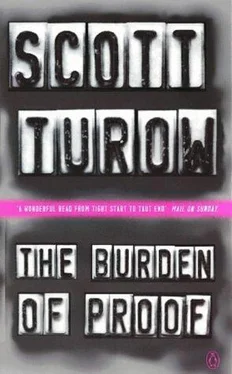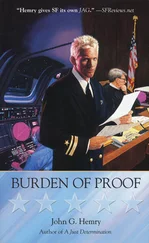Scott Turow - The Burden of Proof
Здесь есть возможность читать онлайн «Scott Turow - The Burden of Proof» весь текст электронной книги совершенно бесплатно (целиком полную версию без сокращений). В некоторых случаях можно слушать аудио, скачать через торрент в формате fb2 и присутствует краткое содержание. Жанр: Детектив, на английском языке. Описание произведения, (предисловие) а так же отзывы посетителей доступны на портале библиотеки ЛибКат.
- Название:The Burden of Proof
- Автор:
- Жанр:
- Год:неизвестен
- ISBN:нет данных
- Рейтинг книги:3 / 5. Голосов: 1
-
Избранное:Добавить в избранное
- Отзывы:
-
Ваша оценка:
- 60
- 1
- 2
- 3
- 4
- 5
The Burden of Proof: краткое содержание, описание и аннотация
Предлагаем к чтению аннотацию, описание, краткое содержание или предисловие (зависит от того, что написал сам автор книги «The Burden of Proof»). Если вы не нашли необходимую информацию о книге — напишите в комментариях, мы постараемся отыскать её.
The Burden of Proof — читать онлайн бесплатно полную книгу (весь текст) целиком
Ниже представлен текст книги, разбитый по страницам. Система сохранения места последней прочитанной страницы, позволяет с удобством читать онлайн бесплатно книгу «The Burden of Proof», без необходимости каждый раз заново искать на чём Вы остановились. Поставьте закладку, и сможете в любой момент перейти на страницу, на которой закончили чтение.
Интервал:
Закладка:
Stern smiled amiably, but naturally offered no comment. A medical history, he noted. "Sometimes I think I'm nuts getting started at this age."
"Well, you say your husband is experienced."
"Oh, Charlie? I'm not sure he's noticed that I'm pregnant."
She laughed, but her eyes veered away as she measured some private thought, so that Stern knew they had abruptly reached the end of this road.
Instead, she reached for the documents, sorted and rubberbanded, which Stern had piled on the desk. They had been organized trade by trade, and she checked them off the subpoena. As she worked, Stern again began quietly asking questions. He had closely examined the records, he said.
They disclosed nothing exceptional. No apparent market manipulation, no passing off bad trades to discretionary accounts, no double-charging of customers, no bucketing, by which the customer would pay a worse price than the house had on the floor.
"It is most difficult from these documents to imagine What your informant is alleging. You have not.subpoenaed records of a single account that Dixon controls. Nothing here is tied to him." There was some flicker, a reflexive contraction within her serious brown eyes.
Stern made no mention of the house error account, or the documents that Klonsky was trying to obtain from Dixon's bank. He would never belie the impression that he was as ignorant as the government wished to keep him.
"Can I ask?" she said abruptly.
"Of course."
"Why does it matter whether there's an informant? Assume there is."
Indeed, thought Stern.
"Do you not think your target is entitled to know what wrongdoing this informant is claiming against him? He was about to use her name, but he did not feel comfortable with 'Sonia' and thought it would be too stiff reverting to 'Ms. Klonsky." "Is Mr. Harmell obliged to stand by idly while the government determines if it can puzzle together one scrap of paper here, another there, until it has its case and is ready, quite literally, to destroy his livelihood and his life?"
"I don't see how he'll be hurt by waiting now."
"He may' assist. If I understand what your informant says, I might be able to bring pertinent matters to your attention."
"And you might also be able to identify the witnesses in advance, try to influence them, and do YOUr best to control the flow of information."
He stared at her a second.
"Just so," said Stern quietly. He could not prevent a momentary scowl.
The barroom wags were right about her. Not that she was incorrect in her estimate of Stern's intentions; hardly. But there was something naive in the way she presumed to inhibit him. Whether Ms. Klonsky knew it or not, she was engaged in a contest, a process, not the search for the Holy Grail. When she brought witnesses quailing into the grand jury room, where their lawyers could not accompany them, where the thought of every indiscretion, every lapse, accosted them like bogeymen, so that these persons were slavish in their eagerness to please the prosecutors, this, per Klonsky, was not influence. It was the government at work.
But if the target's lawyer spoke to the witnesses himself, reviewed their records, and tried to keep their recollections balanced, that bordered on subornation. The problem was simple: she was still new to her job. Poor Sonia Klonsky.
Past forty and still so much to learn. He found himself quite disappointed. "You're angry," she said.
"Not so."
"I wasn't suggesting that you would do anything unethical."
"Nor did I take it that way."
Stern spent a further moment unloading his cases, withdrawing bundles of documents with their blackened edges of copier murk. Ms. Klonsky was still disconcerted by the change of mood.
"I thought we were having"-she waved a hand-and exchange."
"We disagree," said Stern. "Consider it a matter of obligation, of our respective roles." He stood. "Where might I expect you to go next?" She looked at him a moment.
"I don't feel satisfied, Sandy."
How in the world had Stan Sennett hired this woman? Did she want to have sensitivity sessions in the grand jury? What a remarkable person.
In spite of his reluctance to admit it, she had some quality of magnetism. Her smile, especially in its sly aspect, was endearing; a deep, serious intelligence glinted in her eyes. But he felt braced by the recognition of a moment before. With Sonia Klonsky, one had the sense that, for all her woman-on-the-go composedness, a fragment of her soul remained on the verge of hysteria. There was something seething, molten, uncontrolled, unknown. That had a touching quality as well-a woman past forty, still on the voyages of a teenager.
"Ms. Klonsky," he said, "we really do not need to engage in hand-wringing. I assure you, we shall remain on cordial terms." He offered his hand. Instead, she sank down in the chair behind her desk, her face still dark and troubled, and rattled open a drawer.
"There's one other thing. Since you represent Mr. Hartnell, we can't agree to serve you when we subpoena other witnesses from MD. The potential for conflict is too great."
Something new was coming, Stern realized. Klonsky was saying, in effect, that she would soon be setting sails for Dixon's employees, attempting to get them to testify against the boss. If the government had its way, each would have a different lawyer. This was the prosecutors' usual stance. Divide and conquer. Under the guise of concern about professional ethics, they tried to ensure that anyone who might have something to blab to them would not be under the influence of the target's lawyer. Stern agreed wholeheartedly about the ethical precepts, but believed that the right to determine conflicts in the first instance was his, not the U.S. Attorney's. He protested now, but Ms. Klonsky reverted to her firm look, forbidding. further discussion.
"Anyway," she said, "Stan thought there was one subpoena that should be served on you. As a courtesy." Klon-sky opened a manila folder and removed a single sheet of paper, offering it to Stern. "We gave him a long date-almost a month-so you'll have plenty of time to help him arrange for separate counsel." Dumbly, Stern nodded. When he looked back, Klonsky was filling out a return of service on the back of her file copy, recording on whom and when the subpoena had been served.
He had been having such a buoyant spell, Stern thought with sudden fodomness, gibing with this able young woman, assaying her character.
Now this. His arms, as he looked at the subpoena, were leaden with alarm. Some primitive curse rose up in him against Dixon and his inevitably tortured courses. From the way this was being handled, the acknowledged special treatment, Stern suspected at once what was afoot.
"Are there other persons from the order desk whom you expect to call?" he asked offhandedly, hoping the import of the question would slip past her, and Klonsky simply shook her head as she wrote. Stern, at once, felt his condition grow worse. The order tickets Margy had promised to request from the Kindle office had not yet reached him, but he knew now what they would show. Dixon had not called just anyone on the order desk to trade ahead, as Margy had speculated; that, apparently, Would have entailed too much risk, the chance that someone shrewd and less obedient might speak up, object. Instead, Dixon had conveyed the orders to a single compliant sap, the only soul on the order desk with whom the government needed to speak. And, of course, his daughter had married him. Stern folded the subpoena into three even parts. "John Granum" had been typed on the dotted lines reserved for name and address. His son-in-law now had a date certain for.grand jury testimony. Klonsky's guile, her fear of undue influence on the critical witnesses, was growing more understandable. "Is he a target?" asked Stern.
Читать дальшеИнтервал:
Закладка:
Похожие книги на «The Burden of Proof»
Представляем Вашему вниманию похожие книги на «The Burden of Proof» списком для выбора. Мы отобрали схожую по названию и смыслу литературу в надежде предоставить читателям больше вариантов отыскать новые, интересные, ещё непрочитанные произведения.
Обсуждение, отзывы о книге «The Burden of Proof» и просто собственные мнения читателей. Оставьте ваши комментарии, напишите, что Вы думаете о произведении, его смысле или главных героях. Укажите что конкретно понравилось, а что нет, и почему Вы так считаете.












